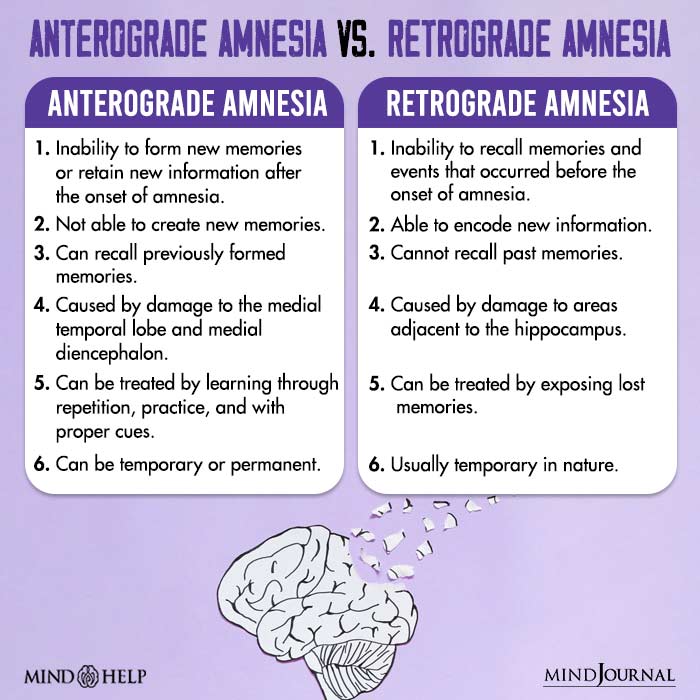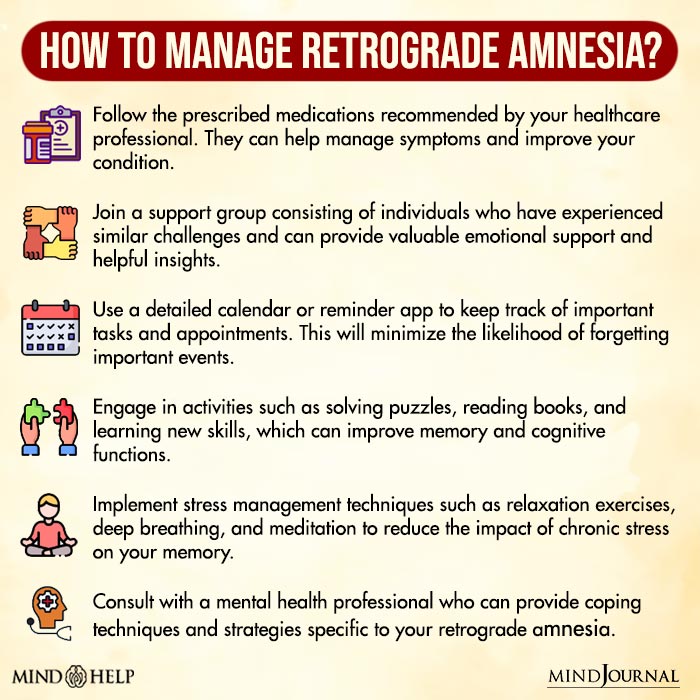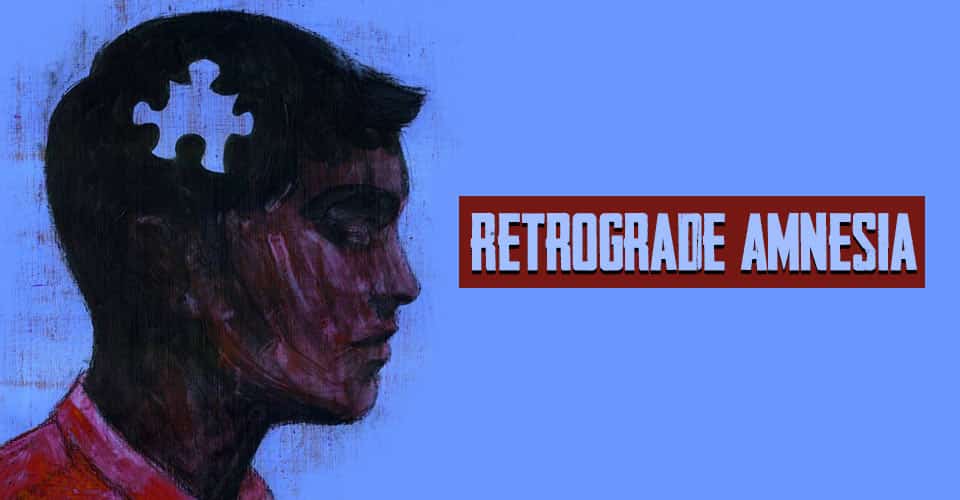Table of Contents
Retrograde amnesia is a condition that hinders the ability to remember past events or experiences. It can have significant effects on a person’s sense of self, relationships with others, daily functioning, and mental well-being.
What is Retrograde Amnesia?
Retrograde amnesia refers to a specific type 1 Montag D. (2021). Retrograde Amnesia – A Question of Disturbed Calcium Levels?. Frontiers in cellular neuroscience, 15, 746198. https://doi.org/10.3389/fncel.2021.746198 of memory loss that affects the ability to recall and retrieve memories formed prior to the onset of amnesia.
It occurs when the memory-storage areas in various regions of the brain are damaged, often due to factors like 2 Reed, J. M., & Squire, L. R. (1998). Retrograde amnesia for facts and events: findings from four new cases. The Journal of neuroscience : the official journal of the Society for Neuroscience, 18(10), 3943–3954. https://doi.org/10.1523/JNEUROSCI.18-10-03943.1998 traumatic brain injuries, serious illnesses, seizures or strokes, and degenerative brain diseases. The duration and progression of symptoms can vary depending on the underlying cause.
One example of retrograde amnesia is difficulty remembering personal details such as car ownership, the specific type of car owned, or the date of purchase.
However, individuals with this condition can still retain the ability to perform activities like driving, as those skills are stored in different areas of the brain. Hence, memory loss in retrograde amnesia generally pertains 3 Allen R. J. (2018). Classic and recent advances in understanding amnesia. F1000Research, 7, 331. https://doi.org/10.12688/f1000research.13737.1 to factual information rather than learned skills.
Case Example:
Robert Anderson, a 30-year-old marketing manager, has recently developed an inability to recall events and details from the past six months of his life. This consequence stems from a car accident he experienced 6 months back while returning from work. The accident resulted in a brain injury and trauma to his mind.
After receiving necessary treatment and recovering, Robert realized that he is not able to remember any events that occurred prior to the accident. This lack of recollection has led to frustration and distress as he struggles to recall important personal and professional experiences from that time period.
Although Robert is capable of retaining and remembering new information, but discussing events from the six months before the accident, whether at the office or with friends, leaves him highly confused, anxious, and irritable. Continuously attempting to retrieve past information has rendered Robert vulnerable and trapped in a state of confusion, adversely impacting his mental well-being and daily activities.
Case Analysis:
From the present case, it can be observed that Robert is experiencing impaired functioning in his cognitive, emotional, and social domains of life.
He has prominent signs of forgetfulness, difficulties in mental coordination, general confusion, inability to retrieve information that happened before the incident, irritability, depressed thoughts, and behaviors, all of which reflect that Robert has significant signs of retroactive amnesia.
Symptoms of Retrograde Amnesia
Common retrograde amnesia symptoms may include 4 Reed, J. M., & Squire, L. R. (1998). Retrograde amnesia for facts and events: findings from four new cases. The Journal of neuroscience : the official journal of the Society for Neuroscience, 18(10), 3943–3954. https://doi.org/10.1523/JNEUROSCI.18-10-03943.1998 :
- Difficulty recalling events that occurred before the onset of amnesia.
- Forgetting facts, general knowledge, and details learned prior to the amnesia.
- Struggling to remember names, faces, places, dates, and other previously known information.
- Retaining skills and abilities acquired before the amnesia.
- Retaining older long-term memories, such as childhood events, more effectively compared to recent memories.

Types of Retrograde Amnesia
The following are the types of 5 Eslinger, P. J., Easton, A., Grattan, L. M., & Van Hoesen, G. W. (1996). Distinctive forms of partial retrograde amnesia after asymmetric temporal lobe lesions: possible role of the occipitotemporal gyri in memory. Cerebral cortex (New York, N.Y. : 1991), 6(3), 530–539. https://doi.org/10.1093/cercor/6.3.530 retrograde amnesia:
1. Focal Retrograde Amnesia
This is characterized by memory loss 6 Kopelman M. D. (2000). Focal retrograde amnesia and the attribution of causality: An exceptionally critical view. Cognitive neuropsychology, 17(7), 585–621. https://doi.org/10.1080/026432900750002172 for a specific category of information or a specific type of memory, while other types of memory remain intact. For instance, a person may have no recollection of a certain period in their life, such as their high school years, including specific events, people, and experiences.
2. Temporally Graded Retrograde Amnesia
In this type of amnesia, a person may have difficulty recalling events and information that occurred shortly before the onset of amnesia, while memories from the more distant past may be relatively preserved.
3. Dissociative Amnesia
This type of retrograde amnesia is believed to be 7 Mangiulli, I., Otgaar, H., Jelicic, M., & Merckelbach, H. (2021). A Critical Review of Case Studies on Dissociative Amnesia. Clinical Psychological Science, 10(2), 216770262110181. https://doi.org/10.1177/21677026211018194 caused by psychological factors rather than physical brain injury. It typically occurs following a traumatic or stressful event and involves the loss of memories for a specific period of time before the event.
4. Post-Traumatic Amnesia (PTA)
Post-traumatic amnesia is a type 8 Ahmed, S., Bierley, R., Sheikh, J. I., & Date, E. S. (2000). Post-traumatic amnesia after closed head injury: a review of the literature and some suggestions for further research. Brain injury, 14(9), 765–780. https://doi.org/10.1080/026990500421886 of amnesia that occurs as a result of a brain injury, such as a stroke, coma, or head trauma. Individuals experiencing post-traumatic amnesia often have difficulty recalling the specific event or events that led to their amnesia.
5. Transient Global Amnesia (TGA)
Transient Global Amnesia (TGA) is a temporary and sudden 9 Nehring, S. M., & Kumar, A. (2020). Transient Global Amnesia. PubMed; StatPearls Publishing. Available from: https://www.ncbi.nlm.nih.gov/books/NBK442001/ episode of memory loss, typically lasting for a few hours. An example of retrograde amnesia with an episode of TGA is, a sudden inability to form new memories and difficulty recalling recent events or information. However, their long-term memory and other cognitive functions remain intact.
What Causes Retrograde Amnesia
Retrograde amnesia can be 10 Reed, J. M., & Squire, L. R. (1998). Retrograde amnesia for facts and events: findings from four new cases. The Journal of neuroscience : the official journal of the Society for Neuroscience, 18(10), 3943–3954. https://doi.org/10.1523/JNEUROSCI.18-10-03943.1998 caused by various factors, including:
- A temporary lack of oxygen to the brain during a heart attack can lead to brain damage and further develop retrograde amnesia.
- Conditions like Alzheimer’s, Huntington’s 11 N., B. L. J., & RAMANATHAN, A. (2021). HUNTINGTON’S DISEASE: CURRENT ADVANCES AND FUTURE PROSPECTS. International Journal of Pharmacy and Pharmaceutical Sciences, 9–14. https://doi.org/10.22159/ijpps.2021v13i12.42979 , and multiple sclerosis can affect cognitive functioning which may contribute to retrograde amnesia.
- Electroconvulsive therapy (ECT), which involves 12 Chakrabarti, S., Grover, S., & Rajagopal, R. (2010). Electroconvulsive therapy: a review of knowledge, experience and attitudes of patients concerning the treatment. The world journal of biological psychiatry : the official journal of the World Federation of Societies of Biological Psychiatry, 11(3), 525–537. https://doi.org/10.3109/15622970903559925 inducing seizures with electrical currents, can cause retrograde memory loss.
- Brain infections, such as 13 Sarrazin, J. L., Bonneville, F., & Martin-Blondel, G. (2012). Brain infections. Diagnostic and interventional imaging, 93(6), 473–490. https://doi.org/10.1016/j.diii.2012.04.020 encephalitis, can damage memory-related areas of the brain.
- Chronic alcohol abuse can lead to a thiamine (B12) 14 Popa, I., Rădulescu, I., Drăgoi, A. M., Trifu, S., & Cristea, M. B. (2021). Korsakoff syndrome: An overlook (Review). Experimental and therapeutic medicine, 22(4), 1132. https://doi.org/10.3892/etm.2021.10566 deficiency called Korsakoff’s syndrome, resulting in retrograde amnesia.
- Seizures (uncontrollable electrical activity in the brain) caused by 15 Huff, J. S., & Murr, N. (2022, September 5). Seizure. PubMed; StatPearls Publishing. Available from: https://www.ncbi.nlm.nih.gov/books/NBK430765/ other factors can damage brain areas associated with memory.
- Brain damage from stroke, injury, emotional trauma, mental illness, and a history of other psychological turmoil can result in certain memory loss.
How to Diagnose Retrograde Amnesia
Accurate diagnosis plays a critical role 16 Squire, L. R., Haist, F., & Shimamura, A. P. (1989). The neurology of memory: quantitative assessment of retrograde amnesia in two groups of amnesic patients. The Journal of neuroscience : the official journal of the Society for Neuroscience, 9(3), 828–839. https://doi.org/10.1523/JNEUROSCI.09-03-00828.1989 in determining the appropriate course of retrograde amnesia treatment, which typically includes:
- Examining the medical history of any known incidents or conditions that may have contributed to the memory loss.
- A physical examination may be performed to assess overall health condition.
- Neurological tests such as electroencephalography (EEG) 17 Rayi, A., & Murr, N. (2021). Electroencephalogram. PubMed; StatPearls Publishing. Available from: https://www.ncbi.nlm.nih.gov/books/NBK563295/ , magnetic resonance imaging (MRI) 18 Crosson, B., Ford, A., McGregor, K. M., Meinzer, M., Cheshkov, S., Li, X., Walker-Batson, D., & Briggs, R. W. (2010). Functional imaging and related techniques: an introduction for rehabilitation researchers. Journal of rehabilitation research and development, 47(2), vii–xxxiv. https://doi.org/10.1682/jrrd.2010.02.0017 , or computed tomography (CT) to identify any abnormalities or damage, and neurological functions.
- Psychological assessments such as the Wechsler memory scale 19 Schmidtke, K., & Vollmer, H. (1997). Retrograde amnesia: a study of its relation to anterograde amnesia and semantic memory deficits. Neuropsychologia, 35(4), 505–518. https://doi.org/10.1016/s0028-3932(96)00109-1 (WMS) may be conducted to identify the factors impacting memory.
- Blood tests may be conducted to check infections, nutritional deficiencies, or hormonal imbalances contributing to retrograde amnesia.
Retrograde Amnesia Treatment
While there is no specific cure 20 Gold, P. E., & Sternberg, D. B. (1978). Retrograde amnesia produced by several treatments: evidence for a common neurobiological mechanism. Science (New York, N.Y.), 201(4353), 367–369. https://doi.org/10.1126/science.208153 for retrograde amnesia, treatment focuses on addressing the underlying causes and managing symptoms. Here are some common treatments:
1. Occupational Therapy
This therapy helps in coping with retrograde amnesia symptoms by recreating or replacing lost memories 21 Nott, M. T., Chapparo, C., & Heard, R. (2008). Effective occupational therapy intervention with adults demonstrating agitation during post-traumatic amnesia. Brain injury, 22(9), 669–683. https://doi.org/10.1080/02699050802227170 . Therapists may involve family or friends to help create new memories of the events that an individual with retrograde amnesia is unable to recall.
2. Psychotherapy
Psychotherapy, such as Cognitive Behavioral Therapy (CBT) focuses on 22 Cassel, A., & Humphreys, K. (2016). Psychological therapy for psychogenic amnesia: Successful treatment in a single case study. Neuropsychological rehabilitation, 26(3), 374–391. https://doi.org/10.1080/09602011.2015.1033431 coping with retrograde amnesia-related factors such as negative thoughts and behaviors linked to the traumatic or stressful event.
Psychotherapy can also help in combating associated symptoms such as depression, obsessive compulsions, anxiety, and even relationships with friends and family members.
Read More About Psychotherapy Here
3. Medications
Medications (such as donepezil) can play 23 Rossato, J. I., Bonini, J. S., Coitinho, A. S., Vianna, M. R., Medina, J. H., Cammarota, M., & Izquierdo, I. (2004). Retrograde amnesia induced by drugs acting on different molecular systems. Behavioral neuroscience, 118(3), 563–568. https://doi.org/10.1037/0735-7044.118.3.563 a crucial role in treating the underlying conditions that contribute to retrograde amnesia, such as brain infections, cardiac problems, anoxia, and thiamine deficiency.

Frequently Asked Questions (FAQs)
1. What is the most common cause of retrograde amnesia?
Retrograde amnesia occurs as a result of damage to the brain’s memory-storage areas.
2. Is retrograde amnesia neurological?
Yes, retrograde amnesia is a neurological condition characterized by the impairment in memory retrieval caused by damage or dysfunction in the brain’s memory-storage areas or related neural networks.
3. Is retrograde amnesia similar to Alzheimer’s?
Retrograde amnesia and Alzheimer’s disease are distinct conditions, although they both involve in memory impairment and can affect cognitive functioning.










